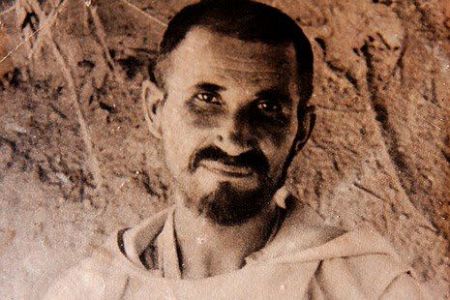|
|
Previous:
St. Andrew the Apostle November 30 Next:
St. Vibiana December 2 St. Charles de FoucauldDecember 1 French.
French.1858-1916 Born to an aristocratic family; orphaned by age six, he and his sister Mary were raised by their grandfather. Studied at Jesuit schools in Nancy and Paris, France from 1872 to 1875. Entered the Saint-Cyr Military Academy in 1876. Joined the 4th Hussar regiment; in 1880 his unit was sent to Setif, Algeria. He was discharged from the service in March 1881 for misconduct, and moved to Evian, France. During the Revolt of Bon Mama in South Oran two months later, Charles re-enlisted, and fought for the eight months of the rebellion. He became so fascinated with the Arabs that he met that when he could not obtain a leave of absence to study them, he resigned his commission. He spent 15 months learning Arabic and Hebrew, and then traveled into Morocco. In May 1885 he received the Gold Medal of the French Geographic Society for his work. He explored Algeria and Tunisia from September 1885 through January 1886, returning to Paris in February to work on his book Reconnaissance au Maroc, which was published in 1888. He lived very simply, sleeping on the floor, spending hours each day in prayer at home and in church. Pilgrim to the Holy Lands from November 1888 to February 1889, and spent much of the rest of 1889 in spiritual retreats. On 16 January 1890 he joined the Trappist monks at the monastery of Notre Dames-des-Neiges, taking the name Brother Marie-Alberic; he moved to the monastery of Akbes, Syria in June. Sent to study in Rome in October 1896, but after three months it became obvious that his heart, head and spirit were elsewhere, and he was released from his vows. He made multiple pilgrimages through the Holy Lands on foot before returning to France to study for the priesthood. Ordained on 9 June 1901 at Viviers. He moved to the Oran region near Morocco in late 1901 to establish a base and found an order to evangelize Morocco. In 1902 he began a program of buying slaves in order to free them. In 1904 he began evangelizing nomadic Tauregs in the area of south and central Sahara. Translated the Gospels into the language of the Tauregs. In November 1908 he translated Taureg poetry to French, and he spent years compiling a Taureg lexicon. In March 1909 he succeeded in founding the Union of Brothers and Sisters of the Sacred Heart to evangelize the French colonies in Africa. Killed when caught in the middle of combat between French forces and Arab insurrectionists. Born to an aristocratic family; orphaned by age six, he and his sister Mary were raised by their grandfather. Studied at Jesuit schools in Nancy and Paris, France from 1872 to 1875. Entered the Saint-Cyr Military Academy in 1876. Joined the 4th Hussar regiment; in 1880 his unit was sent to Setif, Algeria. He was discharged from the service in March 1881 for misconduct, and moved to Evian, France. During the Revolt of Bon Mama in South Oran two months later, Charles re-enlisted, and fought for the eight months of the rebellion. He became so fascinated with the Arabs that he met that when he could not obtain a leave of absence to study them, he resigned his commission. He spent 15 months learning Arabic and Hebrew, and then traveled into Morocco. In May 1885 he received the Gold Medal of the French Geographic Society for his work. He explored Algeria and Tunisia from September 1885 through January 1886, returning to Paris in February to work on his book Reconnaissance au Maroc, which was published in 1888. He lived very simply, sleeping on the floor, spending hours each day in prayer at home and in church. Pilgrim to the Holy Lands from November 1888 to February 1889, and spent much of the rest of 1889 in spiritual retreats. On 16 January 1890 he joined the Trappist monks at the monastery of Notre Dames-des-Neiges, taking the name Brother Marie-Alberic; he moved to the monastery of Akbes, Syria in June. Sent to study in Rome in October 1896, but after three months it became obvious that his heart, head and spirit were elsewhere, and he was released from his vows. He made multiple pilgrimages through the Holy Lands on foot before returning to France to study for the priesthood. Ordained on 9 June 1901 at Viviers. He moved to the Oran region near Morocco in late 1901 to establish a base and found an order to evangelize Morocco. In 1902 he began a program of buying slaves in order to free them. In 1904 he began evangelizing nomadic Tauregs in the area of south and central Sahara. Translated the Gospels into the language of the Tauregs. In November 1908 he translated Tauareg poetry to French, and he spent years compiling a Taureg lexicon. In March 1909 he succeeded in founding the Union of Brothers and Sisters of the Sacred Heart to evangelize the French colonies in Africa. Killed when caught in the middle of combat between French forces and Arab insurrectionists. "Father, I abandon myself into Your hands; do with me what You will. Whatever You do I thank You. I am ready for all, I accept all. Let only Your will be done in me, as in all Your creatures, I ask no more than this, my Lord. Into Your hands I commend my soul; I offer it to You, O Lord, with all the love of my heart, for I love You, my God, and so need to give myself - to surrender myself into Your hands, without reserve and with total confidence, for You are my Father." - St. Charles's Prayer of Abandonment View All Saints |




